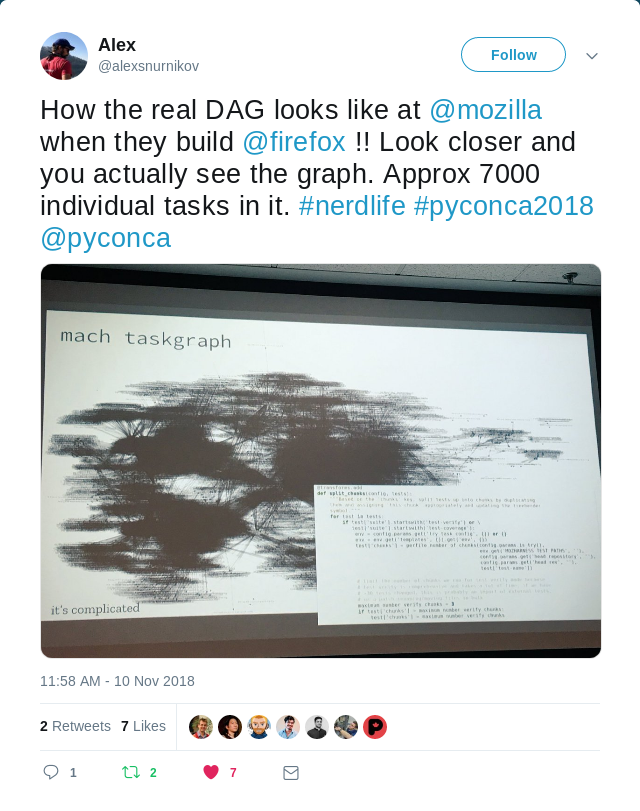PyCon Canada 2018
I've very happy to have had the opportunity to attend and speak at PyCon Canada here in Toronto last week.
PyCon has always been a very well organized conference. There are a wide range of talks available, even on topics not directly related to Python. I've attended previous PyCon events in the past, but never the Canadian one!
My talk was titled How Mozilla uses Python to Build and Ship Firefox. The slides are available here if you're interested. I believe the sessions were recorded, but they're not yet available online. I was happy with the attendance at the session, and the questions during and after the talk.
As part of the talk, I mentioned how Release Engineering is a very distributed team. Afterwards, many people had followup questions about how to work effectively with remote teams, which gave me a great opportunity to recommend John O'Duinn's new book, Distributed Teams.
Some other highlights from the conference:
-
CircuitPython: Python on hardware I really enjoyed learning about CircuitPython, and the work that Adafruit is doing to make programming and electronics more accessible.
-
Using Python to find Russian Twitter troll tweets aimed at Canada A really interesting dive into 3 million tweets that FiveThirtyEight made available for analysis.
-
PEP 572: The Walrus Operator My favourite quote from the talk: "Dictators are people too!" If you haven't followed Python governance, Guido stepped down as BDFL (Benevolent Dictator for Life) after the PEP was resolved. Dustin focused much of his talk about how we in the Python community, and more generally in tech, need to treat each other better.
-
Who's There? Building a home security system with Pi & Slack A great example of how you can get started hacking on home automation with really simple tools.
-
Froilán Irzarry's Keynote talk on the second day was really impressive.
-
You Don't Need That! Design patterns in Python My main takeaway from this was that you shouldn't try and write Python code as if it were Java or C++ :) Python has plenty of language features built-in that make many classic design patterns unnecessary or trivial to implement.
-
Numpy to PyTorch Really neat to learn about PyTorch, and leveraging the GPU to accelerate computation.
-
Flying Python - A reverse engineering dive into Python performance Made me want to investigate Balrog performance, and also look at ways we can improve Python startup time. Some neat tips about examining disassembled Python bytecode.
-
Working with Useless Machines Hilarious talk about (ab)using IoT devices.
-
Gathering Related Functionality: Patterns for Clean API Design I really liked his approach for creating clean APIs for things like class constructors. He introduced a module called variants which lets you write variants of a function / class initializer to support varying types of parameters. For example, a common pattern is to have a function that takes either a string path to a file, or a file object. Instead of having one function that supports both types of arguments, variants allows you to make distinct functions for each type, but in a way that makes it easy to share underlying functionality and also not clutter your namespace.
